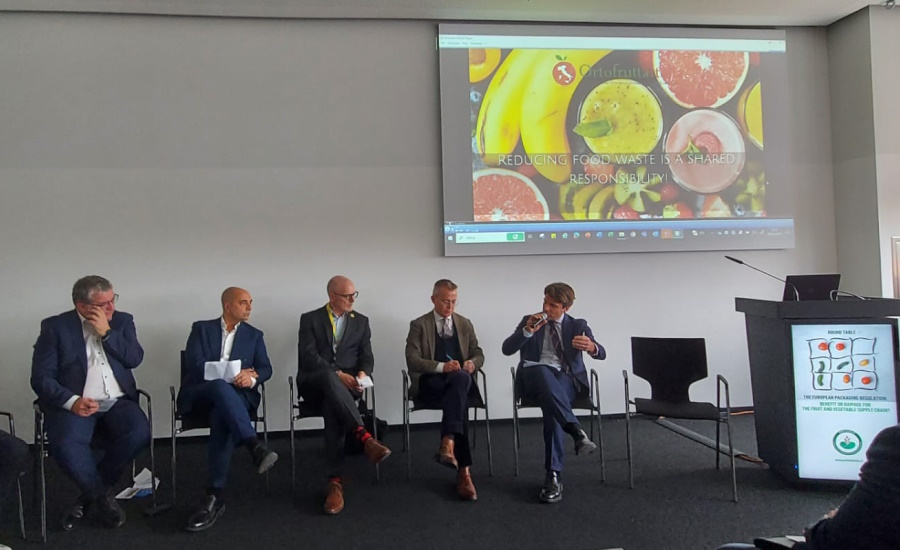
Participants in the round table organized by Pro Food at the Fruit Logistica trade fair in Berlin. (Courtesy of Pro Food)
Round Table Participants Stress Important Role of Packaging for Fresh Food
The proposed Packaging and Packaging Waste Regulation (PPWR) has reached its final stages, with the confrontation between the two positions expressed in late 2023 by the European Parliament and the EU Council.
While discussions are taking place in Brussels to find a compromise, Pro Food, the association representing the main European producers of fresh food packaging, organized at Fruit Logistica the round table The European Packaging Regulation: Benefit or Damage for the Fruit and Vegetable Supply Chain?, during which some of the strategic representatives of the sector shared their evaluations of PPWR.
Very critical of the proposal to eliminate packaging for fruits and vegetables is Massimiliano del Core, president of Ortofrutta Italia, who stressed the importance of plastic packaging in defending the value of products and prolonging shelf life, a relevant aspect especially for the export of fruit and vegetables. "Furthermore," he added, "packaging is a tool to combat food waste, which occurs 70 percent after purchase by end consumers. No less important, finally, is the role that packaging plays in enhancing the value of fruit and vegetables in the markets through the communication of product characteristics and origin. The regulation should focus on end-of-life management to incentivize recycling."
Luigi Scordamaglia, CEO of Filiera Italia and president of Eat Europe, is on the same page, noting how the proposed regulation would lead to the destruction of 32,000 jobs in Italy alone. "On the one hand, the EU invests funds in promoting the consumption of healthy foods, of which fruit and vegetables are central, and on the other hand, by eliminating packaging, it prevents the very promotion of these products while also increasing food waste."
Martin Engelmann, general manager of IK Industrievereinigung Kunststoffverpackungen, which represents the plastics processing industries in Germany, points out that from a legal standpoint, the ban on the use of only plastic packaging probably violates the principle of equal treatment enshrined in EU law, unless there is an objective justification for differential treatment. "In this regard," he says, "the EU legislator has a margin of discretion, but with certain limits. In particular, it must take into account all available scientific facts and data."
Philippe Binard, Freshfel Europe's delegate general, points out that pointing the finger at the fruit and vegetable sector is disproportionate to its impact on the volumes of packaging placed on the market: "In fact, packaging for fresh produce accounts for only 1.5 percent of all food packaging currently used in the EU. Moreover, about 50 percent of fruits and vegetables are already sold in bulk, showing that the market has already optimized as much as it could be.”
Concerns about the risks to the sustainability of the fruit and vegetable supply chain brought about by regulatory proposals are not unique to the European Union.
Daniel Duguay, sustainability specialist at CPMA (Canadian Produce Marketing Association), brought testimony bearing on this, explaining how in Canada they are experiencing a situation very similar to that in Europe because of the federal Ministry of Environment's proposal. This calls for the sale of fruits and vegetables in bulk or in plastic-free packaging (75 percent by 2026 and 95 percent by 2028), and CPMA has done several studies showing that this would have a negative impact on the sustainability of Canada's fresh produce supply chain.
"Rather," comments Duguay, "more space should be given to closing structural gaps for the realization of a true circular economy. Attention should be given to educating consumers about the role that primary packaging plays in food: the value of packaging is largely unperceived when you consider that 90 percent of its function is performed before the consumer sees it on the store shelf."
Mauro Salini, President of Pro Food, said, "Packaging is an essential factor in the fruit and vegetable supply chain with very important functionalities even if not always obvious to the consumer. The elimination or replacement of plastic packaging must be evaluated with scientific data not only of the packaging itself but also of the impact on logistics and content."
These points underscore the complexity of the issue of packaging for fruits and vegetables.